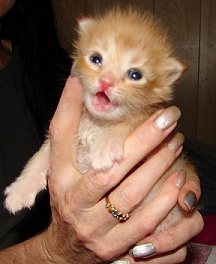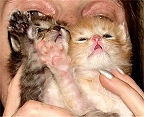Core Vaccines:

- Feline Panleukopenia Virus Vaccine (also called "Feline Distemper")
Panleukopenia is caused by a feline parvovirus (FPV), and is particularly vicious, capable of being spread rapidly, with a high mortality rate, especially in younger cats. After a one-year booster for kittens, this vaccination can be given every three years.
- Feline Calicivirus
This virus, along with the Feline Herpes virus, causes the majority of upper respiratory infections URIs in cats, and can be spread by "carrier" cats for years. This vaccine may be given at three year intervals after the initial series.
- Rhinotracheitis AKA Feline Herpes Virus
Rhinotracheitis has serious potential, especially in kittens. It has been estimated that 70% of cats infected with Rhinotracheitis will die, and it can also cause permanent neurological damage to kittens.
NOTE: These vaccines will not provide total clinical immunity to the diseases, but will minimize the severity of upper respiratory infection.
- Rabies Vaccine
Rabies vaccinations are required by law in most states in the U.S. The interval depends on the jurisdiction, and can be from one to three years. Although the incidence of rabies in cats is relatively low, even indoor cats are at risk, as bats do enter homes. Rabies is always fatal in an unprotected cat, and both the VAFSTF and the AAFP highly recommend vaccination of all cats for this zoonotic disease.
The Rabies vaccine is one which is implicated as causing vaccine-associated sarcoma (VAS), and it is suspected that the adjuvant (carrier) used may be the culprit associated with this vaccine. A new non-adjuvanted vaccine (PureVax Feline Rabies Vaccine, Merial Ltd.) is available, but its reduced likelihood of association with VAS has not yet been proved by studies. This vaccine is presently licensed only for annual administration.
|


